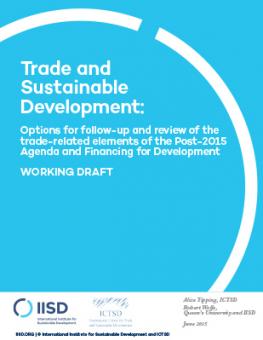
Trade and Sustainable Development: Options for follow-up and review of the trade-related elements of the Post-2015 Agenda and Financing for Development
Trade is reflected throughout the draft Sustainable Development Goals (SDGs) of June 2015 and the May 2015 draft outcome of the third international Financing for Development (FfD) conference. The first aim of this paper is to map where trade-related elements are found in the SDGs and FfD.
Trade is reflected throughout the draft Sustainable Development Goals (SDGs) of June 2015 and the May 2015 draft outcome of the third international Financing for Development (FfD) conference.
The first aim of this paper is to map where trade-related elements are found in the SDGs and FfD. The second aim is to describe the trade-related architecture for review and follow-up that could support these outcomes and to map where it exists or could be built. Trade’s contribution to the post-2015 agenda is diffuse, which means follow-up and review will be a challenge, but it need not be overly burdensome, and it will be useful. The paper identifies six clusters of trade-related elements in the draft SDGs and in the draft FfD outcome, which range from improving access to markets for small-scale producers to strengthening the multilateral trading system. For each cluster, the paper identifies current thinking on indicators, where the necessary data are already collected (if they are) and where progress against these political commitments could be reviewed. The paper then presents the information from another perspective, focusing on the potential roles of a variety of review mechanisms. Given the profusion of options for review mechanisms, an inter-agency task force on trade could provide an analytical synthesis of reporting and reviews useful for discussions at national, regional and global levels of the interrelated effects and trade-offs between goals.
You might also be interested in
Agreement on Climate Change, Trade and Sustainability: A landmark pact for trade and sustainability
The ACCTS pact, signed by Costa Rica, Iceland, New Zealand, and Switzerland, aligns trade and environmental policies, tackling fossil fuel subsidies, eco-labels, and green trade.
Addressing Carbon Leakage: A toolkit
As countries adopt ambitious climate policies, this toolkit examines strategies to prevent carbon leakage—when production and emissions shift to nations with weaker climate policies—and explores the trade-offs of each approach.
IISD Trade and Sustainability Review, December 2024
This edition of the IISD Trade and Sustainability Review presents four expert perspectives on how agricultural support and subsidies can promote sustainability in developing and least developed countries.
Why Trade Matters in the Plastic–Pollution Treaty Negotiations
The global push to end plastic pollution by 2040 highlights the critical intersection of trade and environmental action, with upcoming INC-5 negotiations focusing on reducing plastic production, consumption, and waste within a fair and effective international framework.